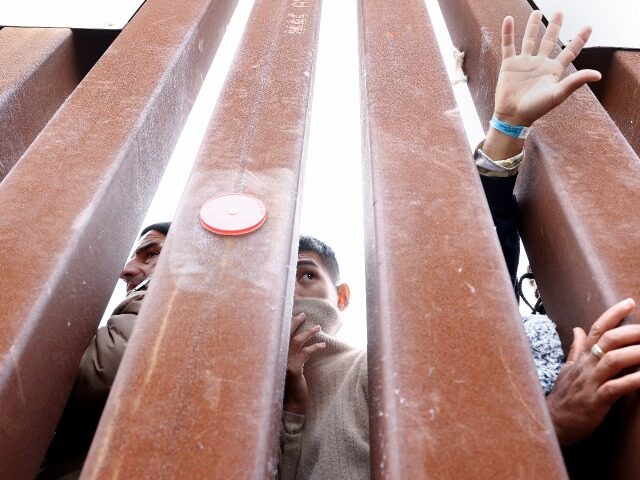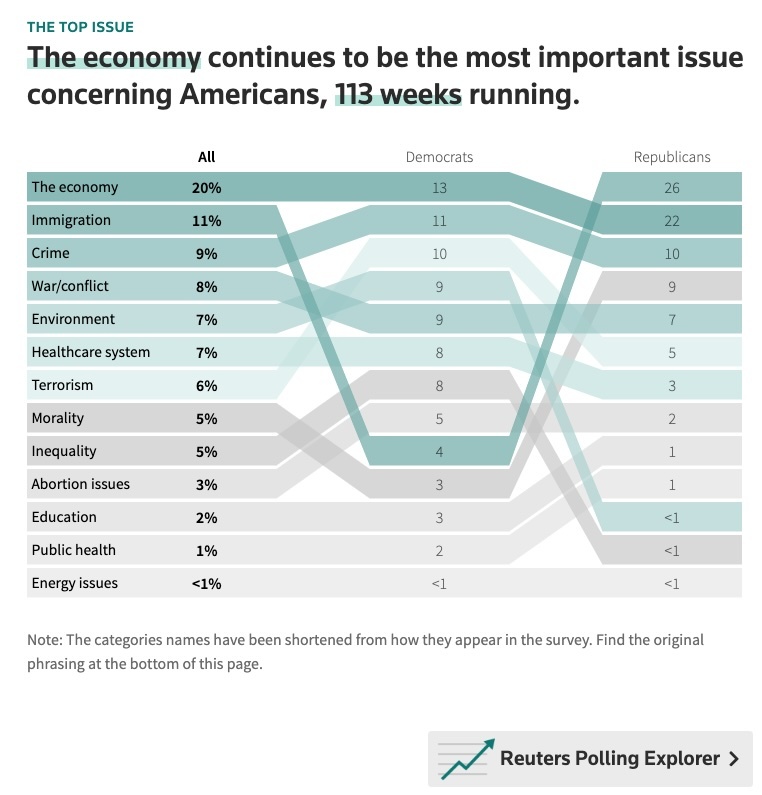New polls show that immigration is now the top issue for Republican voters and that a clear majority of swing state voters support a border wall.
The poll results are also good news for House Speaker Mike Johnson (R-LA), who is using the Capitol Hill budget battles to rebuild border protections for American families.
The Siena College poll for the November 5 New York Times reports that 55 percent of likely voters in six swing states now support a border wall. Just 42 percent oppose the border wall, which is effective if backed up by electronic sensors, nearby border officers, and pro-American border regulations.
Immigration is the top issue for 26 percent of Republican voters, according to a different poll by Reuters, announced on November 7. The 26 percent score is four points above the 22 percent who said the closely related issue of “The economy” is the most important issue.
In turn, just four percent of Democrats say immigration is the biggest issue, said Reuters.
A prior October poll showed that President Joe Biden’s migration has created majority support for the border wall.
Under the polling pressure, even business-dominated GOP Senators are moving to a more popular position on immigration.
Still, the donor-steered GOP is far from earning a decisive voter advantage on the issue — nor is it even close to making a family budget case for migration curbs.
A November 5 poll by Ipsos for ABC News showed that just 36 percent of Americans trust the GOP to handle migration. But that score is well above the 24 percent trust level earned by the Democratic Party. A further seven percent said both parties were similar, and 31 percent said they did not trust either party or skipped the question.
The Siena College poll that showed 55 percent support for the border wall also showed that 42 percent “strongly support” a border wall, while just 29 percent “strongly oppose” a border wall.
The “strongly” held views are important because they show that the issue is likely to shape voting decisions.
Among swing-voting independents, 55 percent support a border wall, while just 28 percent oppose it. The indendents’ “strongly” vote splits 32 percent strongly for to 12 percent strongly against.
The Siena poll of 3,662 likely voters in six states was conducted from October 22 to November 3.
But the public is also squeamish about explicitly excluding migrants from the United States.
The Siena poll, for example, also showed an even split when the public was asked whether the government should make “it harder for migrants at the southern border to seek asylum in the United States.”
The poll showed that 33 percent of all respondents were strongly for curbs, while 27 percent were strongly opposed. Among independents, 30 percent strongly favor curbs, while 21 percent strongly oppose curbs.
Many polls show the public is increasingly hostile to migration, especially since the explosion of pro-Hamas protests in cities around the nation after the October 7 atrocities against Jews in Israel.
For example, a Siena College poll of New Yorkers taken in mid-October after the Hamas attacks showed that New Yorkers described immigration as a “burden” over a “benefit” by 54 percent to 32 percent, with just five percent saying “mixed.”
Compared to a prior poll in August, those “burden” numbers spiked by 12 points among Catholics – up to 62 percent; by five points among Protestants – up to 64 percent; and by four points among the Jewish community – up to 52 percent. The “benefit” shares slipped to 27 percent, 22 percent, and 28 percent.
President Joe Biden’s migration has added at least four million workers to the nation’s workforce.
That flood is urged and welcomed by business groups because it cuts Americans’ blue-collar wages and white-collar salaries.
It also reduces marketplace pressure to invest in productivity-boosting technology, heartland states, and overseas markets, and it reduces economic pressure on the federal government to deal with the drug and “Deaths of Despair” crises.
A never ending line of homeless RVs. Everyone I spoke to says housing outreach is non existent. Three different programs do show up though. One brings sandwiches once a week, Harm reduction workers come twice a week and a elderly lady pic.twitter.com/Igu84ZjcvZ
— Kevin Dahlgren (@kevinvdahlgren) October 15, 2023
Biden’s easy-migration policies are adding the foreigners’ problems to the lengthening list of Americans’ problems — homelessness, low wages, a shrinking middle class, slowing innovation, declining blue-collar life expectancy, spreading poverty, the rising death toll from drugs, and the spreading alienation among young people.


COMMENTS
Please let us know if you're having issues with commenting.